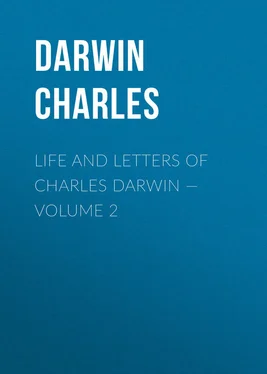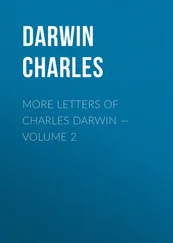Charles Darwin - Life and Letters of Charles Darwin — Volume 2
Здесь есть возможность читать онлайн «Charles Darwin - Life and Letters of Charles Darwin — Volume 2» — ознакомительный отрывок электронной книги совершенно бесплатно, а после прочтения отрывка купить полную версию. В некоторых случаях можно слушать аудио, скачать через торрент в формате fb2 и присутствует краткое содержание. Жанр: foreign_antique, foreign_prose, на английском языке. Описание произведения, (предисловие) а так же отзывы посетителей доступны на портале библиотеки ЛибКат.
- Название:Life and Letters of Charles Darwin — Volume 2
- Автор:
- Жанр:
- Год:неизвестен
- ISBN:нет данных
- Рейтинг книги:3 / 5. Голосов: 1
-
Избранное:Добавить в избранное
- Отзывы:
-
Ваша оценка:
- 60
- 1
- 2
- 3
- 4
- 5
Life and Letters of Charles Darwin — Volume 2: краткое содержание, описание и аннотация
Предлагаем к чтению аннотацию, описание, краткое содержание или предисловие (зависит от того, что написал сам автор книги «Life and Letters of Charles Darwin — Volume 2»). Если вы не нашли необходимую информацию о книге — напишите в комментариях, мы постараемся отыскать её.
Life and Letters of Charles Darwin — Volume 2 — читать онлайн ознакомительный отрывок
Ниже представлен текст книги, разбитый по страницам. Система сохранения места последней прочитанной страницы, позволяет с удобством читать онлайн бесплатно книгу «Life and Letters of Charles Darwin — Volume 2», без необходимости каждый раз заново искать на чём Вы остановились. Поставьте закладку, и сможете в любой момент перейти на страницу, на которой закончили чтение.
Интервал:
Закладка:
"Listen to those who would silence and crush her, and I fear our children will see the glory of England vanishing like Arthur in the mist; they will cry too late the woful cry of Guinever: —
'It was my duty to have loved the highest;
It surely was my profit had I known;
It would have been my pleasure had I seen.'"]
CHARLES DARWIN TO C. LYELL. Down [February 15th, 1860].
... I am perfectly convinced (having read this morning) that the review in the 'Annals' (Annals and Mag. of Nat. Hist. third series, vol. 5, page 132. My father has obviously taken the expression "pestilent" from the following passage (page 138): "But who is this Nature, we have a right to ask, who has such tremendous power, and to whose efficiency such marvellous performances are ascribed? What are her image and attributes, when dragged from her wordy lurking-place? Is she aught but a pestilent abstraction, like dust cast in our eyes to obscure the workings of an Intelligent First Cause of all?" The reviewer pays a tribute to my father's candour, "so manly and outspoken as almost to 'cover a multitude of sins.'" The parentheses (to which allusion is made above) are so frequent as to give a characteristic appearance to Mr. Wollaston's pages.) is by Wollaston; no one else in the world would have used so many parentheses. I have written to him, and told him that the "pestilent" fellow thanks him for his kind manner of speaking about him. I have also told him that he would be pleased to hear that the Bishop of Oxford says it is the most unphilosophical (Another version of the words is given by Lyell, to whom they were spoken, viz. "the most illogical book ever written." — 'Life,' volume ii. page 358.) work he ever read. The review seems to me clever, and only misinterprets me in a few places. Like all hostile men, he passes over the explanation given of Classification, Morphology, Embryology, and Rudimentary Organs, etc. I read Wallace's paper in MS. ("On the Zoological Geography of the Malay Archipelago." — Linn. Soc. Journ. 1860.), and thought it admirably good; he does not know that he has been anticipated about the depth of intervening sea determining distribution... The most curious point in the paper seems to me that about the African character of the Celebes productions, but I should require further confirmation...
Henslow is staying here; I have had some talk with him; he is in much the same state as Bunbury (The late Sir Charles Bunbury, well-known as a Palaeo-botanist.), and will go a very little way with us, but brings up no real argument against going further. He also shudders at the eye! It is really curious (and perhaps is an argument in our favour) how differently different opposers view the subject. Henslow used to rest his opposition on the imperfection of the Geological Record, but he now thinks nothing of this, and says I have got well out of it; I wish I could quite agree with him. Baden Powell says he never read anything so conclusive as my statement about the eye!! A stranger writes to me about sexual selection, and regrets that I boggle about such a trifle as the brush of hair on the male turkey, and so on. As L. Jenyns has a really philosophical mind, and as you say you like to see everything, I send an old letter of his. In a later letter to Henslow, which I have seen, he is more candid than any opposer I have heard of, for he says, though he CANNOT go so far as I do, yet he can give no good reason why he should not. It is funny how each man draws his own imaginary line at which to halt. It reminds me so vividly what I was told (By Professor Henslow.) about you when I first commenced geology — to believe a LITTLE, but on no account to believe all.
Ever yours affectionately, C. DARWIN.
CHARLES DARWIN TO ASA GRAY. Down, February 18th [1860].
My dear Gray,
I received about a week ago two sheets of your Review (The 'American Journal of Science and Arts,' March, 1860. Reprinted in 'Darwiniana,' 1876.); read them, and sent them to Hooker; they are now returned and r-read with care, and to-morrow I send them to Lyell. Your Review seems to me ADMIRABLE; by far the best which I have read. I thank you from my heart both for myself, but far more for the subject's sake. Your contrast between the views of Agassiz and such as mine is very curious and instructive. (The contrast is briefly summed up thus: "The theory of Agassiz regards the origin of species and their present general distribution over the world as equally primordial, equally supernatural; that of Darwin as equally derivative, equally natural." — 'Darwiniana,' page 14.) By the way, if Agassiz writes anything on the subject, I hope you will tell me. I am charmed with your metaphor of the streamlet never running against the force of gravitation. Your distinction between an hypothesis and theory seems to me very ingenious; but I do not think it is ever followed. Every one now speaks of the undulatory THEORY of light; yet the ether is itself hypothetical, and the undulations are inferred only from explaining the phenomena of light. Even in the THEORY of gravitation is the attractive power in any way known, except by explaining the fall of the apple, and the movements of the Planets? It seems to me that an hypothesis is DEVELOPED into a theory solely by explaining an ample lot of facts. Again and again I thank you for your generous aid in discussing a view, about which you very properly hold yourself unbiassed.
My dear Gray, yours most sincerely, C. DARWIN.
P.S. — Several clergymen go far with me. Rev. L. Jenyns, a very good naturalist. Henslow will go a very little way with me, and is not shocked with me. He has just been visiting me.
[With regard to the attitude of the more liberal representatives of the Church, the following letter (already referred to) from Charles Kingsley is of interest:]
C. KINGSLEY TO CHARLES DARWIN. Eversley Rectory, Winchfield, November 18th, 1859.
Dear Sir,
I have to thank you for the unexpected honour of your book. That the Naturalist whom, of all naturalists living, I most wish to know and to learn from, should have sent a scientist like me his book, encourages me at least to observe more carefully, and perhaps more slowly.
I am so poorly (in brain), that I fear I cannot read your book just now as I ought. All I have seen of it AWES me; both with the heap of facts and the prestige of your name, and also with the clear intuition, that if you be right, I must give up much that I have believed and written.
In that I care little. Let God be true, and every man a liar! Let us know what IS, and, as old Socrates has it, epesthai to logo — follow up the villainous shifty fox of an argument, into whatsoever unexpected bogs and brakes he may lead us, if we do but run into him at last.
From two common superstitions, at least, I shall be free while judging of your books: —
1. I have long since, from watching the crossing of domesticated animals and plants, learnt to disbelieve the dogma of the permanence of species.
2. I have gradually learnt to see that it is just as noble a conception of Deity, to believe that he created primal forms capable of self development into all forms needful pro tempore and pro loco, as to believe that He required a fresh act of intervention to supply the lacunas which He Himself had made. I question whether the former be not the loftier thought.
Be it as it may, I shall prize your book, both for itself, and as a proof that you are aware of the existence of such a person as
Your faithful servant, C. KINGSLEY.
[My father's old friend, the Rev. J. Brodie Innes, of Milton Brodie, who was for many years Vicar of Down, writes in the same spirit:
"We never attacked each other. Before I knew Mr. Darwin I had adopted, and publicly expressed, the principle that the study of natural history, geology, and science in general, should be pursued without reference to the Bible. That the Book of Nature and Scripture came from the same Divine source, ran in parallel lines, and when properly understood would never cross...
Читать дальшеИнтервал:
Закладка:
Похожие книги на «Life and Letters of Charles Darwin — Volume 2»
Представляем Вашему вниманию похожие книги на «Life and Letters of Charles Darwin — Volume 2» списком для выбора. Мы отобрали схожую по названию и смыслу литературу в надежде предоставить читателям больше вариантов отыскать новые, интересные, ещё непрочитанные произведения.
Обсуждение, отзывы о книге «Life and Letters of Charles Darwin — Volume 2» и просто собственные мнения читателей. Оставьте ваши комментарии, напишите, что Вы думаете о произведении, его смысле или главных героях. Укажите что конкретно понравилось, а что нет, и почему Вы так считаете.












